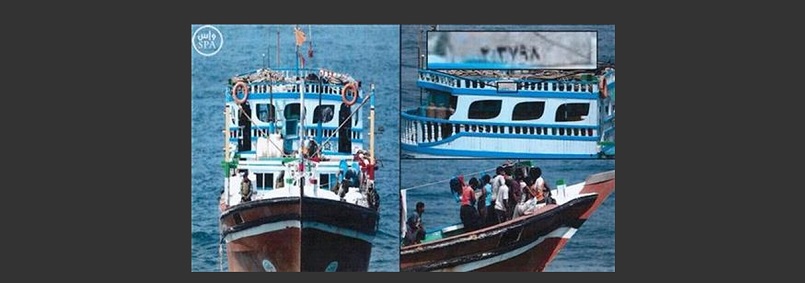
A ship carrying illicit arms believed to be from Iran was intercepted last week by a member of a U.S.-backed naval coalition and was not registered with any country, the U.S. Navy said Wednesday.
The American description of the ship's seizure in the northern Arabian Sea conflicted in some instances with an earlier account provided by a separate Saudi-led coalition battling Yemen's Shiite rebels, which claimed it had foiled the smuggling attempt. The Saudi coalition alleged that Iran was using the vessel to ship arms to the rebels.
The U.S. Navy's 5th Fleet, based in Bahrain, said a member of the Combined Maritime Forces, a longstanding multinational coalition, intercepted the vessel in international waters last Friday.
An American guided missile destroyer, the USS Forrest Sherman, arrived to assist once the weapons were found aboard the dhow, a type of vessel commonly used in the Persian Gulf and Indian Ocean.
A search of the ship determined that it was not formally registered to any country, although the dhow and the arms onboard were believed to have left from Iran, according to the U.S. Navy.
"Based on statements from the dhow's crew, the port of origin of the dhow and its illicit weapons cache is believed to be Iran," the Navy said, adding that the weapons included anti-tank arms thought to be of Iranian and Russian origin.
The crew alleged that the vessel was bound for Somalia, which sits just across the Gulf of Aden from Yemen. They were allowed to depart once the weapons were confiscated, the U.S. said.
Most of the weapons were dumped into the sea, though some were retained for further analysis by the U.S.
Earlier in the day, the Saudi-led coalition claimed it had foiled the smuggling effort, which it said happened a day later than in the American account, some 240 kilometers (150 miles) southeast of the Omani port of Salalah.
Saudi Arabia and its coalition allies fear that Iran is actively providing aid to the rebels, known as Houthis, as a way to gain a foothold on the Arabian Peninsula. Iran acknowledges providing political support to the rebels but denies arming them directly.
According to the Saudi coalition, the ship was carrying 18 pieces of one type of anti-tank missile and 54 of another, as well as launchers and other equipment. Fourteen crew members aboard the ship were arrested, including the captain, identified as Bakhsh Jakal, it said.
The ship was registered to an Iranian named Hogan Mohammed Hout, licensed as a fishing vessel and was carrying papers indicating it was checked by port and customs officials in Iran's southeastern Sistan and Baluchistan province, according to the Saudi-led coalition.
Saudi military officials could not be reached for comment, and it was not possible to reconcile the Saudi and American accounts.
Photos released by the Saudi coalition showed a large traditional wooden dhow with a brown hull and blue-and-white superstructure. The U.S. released photos showing some of the seized arms but not the dhow itself.
Iranian state media carried no report on the allegations, and Iranian authorities could not immediately be reached.
Yemen has been embroiled in fighting that pits the Houthis and forces loyal to a former president against the Saudi-backed and internationally recognized government as well as southern separatists, local militias and Sunni extremists. The coalition has been carrying out airstrikes against the rebels and their allies since March.
The U.S. is providing logistical support to the coalition in Yemen, and American warships separately take part in the routine Combined Maritime Forces patrols. The CMF includes 30 countries, most of them Western, Arab and Asian allies of the U.S.
